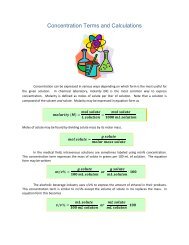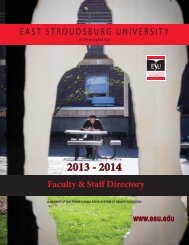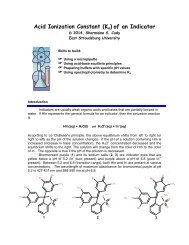Orgon's Obsession in Moliere's Tartuffe
Orgon's Obsession in Moliere's Tartuffe
Orgon's Obsession in Moliere's Tartuffe
You also want an ePaper? Increase the reach of your titles
YUMPU automatically turns print PDFs into web optimized ePapers that Google loves.
14<br />
Viewpo<strong>in</strong>ts Fall 2010<br />
and tell Madame that you’ve expressed keen sympathy and anxious <strong>in</strong>terest” (Moliere 23).<br />
Through this statement, we can see that Dor<strong>in</strong>e is just as puzzled as the audience is and that<br />
she can do noth<strong>in</strong>g but laugh <strong>in</strong> utter disbelief at the hypnotized Orgon.<br />
What does Orgon f<strong>in</strong>d so magnificent about <strong>Tartuffe</strong> that causes him to display such an<br />
<strong>in</strong>fatuation? The playwright answers this question <strong>in</strong> Act I, Scene V, when Orgon recollects the<br />
first time he met <strong>Tartuffe</strong>. Although Orgon offers a reason both for his <strong>in</strong>terest and for his belief<br />
as to why <strong>Tartuffe</strong> seems like such a religious and humble man, the audience can see that his<br />
judgment is extremely weak. Orgon attempts to expla<strong>in</strong>s his <strong>in</strong>terest <strong>in</strong> <strong>Tartuffe</strong>—“He *<strong>Tartuffe</strong>+<br />
is a man who…a man who…an excellent man” (25)—and <strong>in</strong> his stutter<strong>in</strong>g statement, we can see<br />
how Orgon has lost his ability to rationally evaluate anyth<strong>in</strong>g at all. What Orgon says next is<br />
extremely irrational. He comments, “My mother, children, brother, and wife could die, and I’d<br />
not feel a s<strong>in</strong>gle moment’s pa<strong>in</strong>” (25). After Orgon makes this claim, the audience likely expects<br />
him to come to his senses and realize the severity of tell<strong>in</strong>g his brother-<strong>in</strong>-law that he would<br />
feel noth<strong>in</strong>g if his family died. However, Orgon cont<strong>in</strong>ues to justify his th<strong>in</strong>k<strong>in</strong>g, ignor<strong>in</strong>g the<br />
sarcasm of Cleante’s comment, “That’s a f<strong>in</strong>e sentiment, Brother; most humane” (25). By<br />
free<strong>in</strong>g his soul “from earthly loves, and every human tie,” Orgon is almost try<strong>in</strong>g to become a<br />
missionary figure <strong>in</strong> his obsession with <strong>Tartuffe</strong>, putt<strong>in</strong>g aside his own earthly cares <strong>in</strong> favor of<br />
what he perceives to be more spiritual matters: the person of <strong>Tartuffe</strong> himself. Orgon believes<br />
that <strong>Tartuffe</strong> is a sa<strong>in</strong>t because he flaunts his humbleness around the church while publicly<br />
perform<strong>in</strong>g m<strong>in</strong>or tasks <strong>in</strong> church, often pray<strong>in</strong>g loudly, and how modest he is when accept<strong>in</strong>g<br />
only small gifts. It is obvious to all of the other characters and to the audience as well that<br />
<strong>Tartuffe</strong> merely uses religious acts <strong>in</strong> order to appear religious himself. It almost seems as if<br />
Orgon is jok<strong>in</strong>g when he says, “Last week, his *<strong>Tartuffe</strong>’s] conscience was severely pricked<br />
because, while he was pray<strong>in</strong>g, he had caught a flea and killed it, so he felt, too wrathfully”<br />
(Moliere 26). However, Orgon simply reveals his own misguided fixation on <strong>Tartuffe</strong>’s apparent<br />
unassailable goodness.<br />
Cleante then makes a remark that caused much controversy <strong>in</strong> Versailles and<br />
throughout France <strong>in</strong> 1664 when the play was first performed. He replies, “There’s a vast<br />
difference, so it seems to me, between true piety and hypocrisy: How do you fail to see it, may I<br />
ask? Is not a face quite different than a mask?” (27). This remark is perhaps the essence of<br />
Moliere’s motivation for writ<strong>in</strong>g this play. In the 1660s <strong>in</strong> the official French royal court of<br />
Versailles and throughout France, there were more than a few highly prom<strong>in</strong>ent and<br />
supposedly religious and pious people <strong>in</strong> power that Moliere could clearly see were hypocrites<br />
and not people of God with pure <strong>in</strong>tentions. Moliere endeavored to expose these deceptive<br />
authorities or at least provoke questions with<strong>in</strong> his audience. Also, s<strong>in</strong>ce Moliere wrote dur<strong>in</strong>g<br />
the beg<strong>in</strong>n<strong>in</strong>g of the Age of Reason, people were beg<strong>in</strong>n<strong>in</strong>g to demand adherence to common<br />
sense <strong>in</strong> decision-mak<strong>in</strong>g and behavior that was rational. As the character Orgon displays hardly








